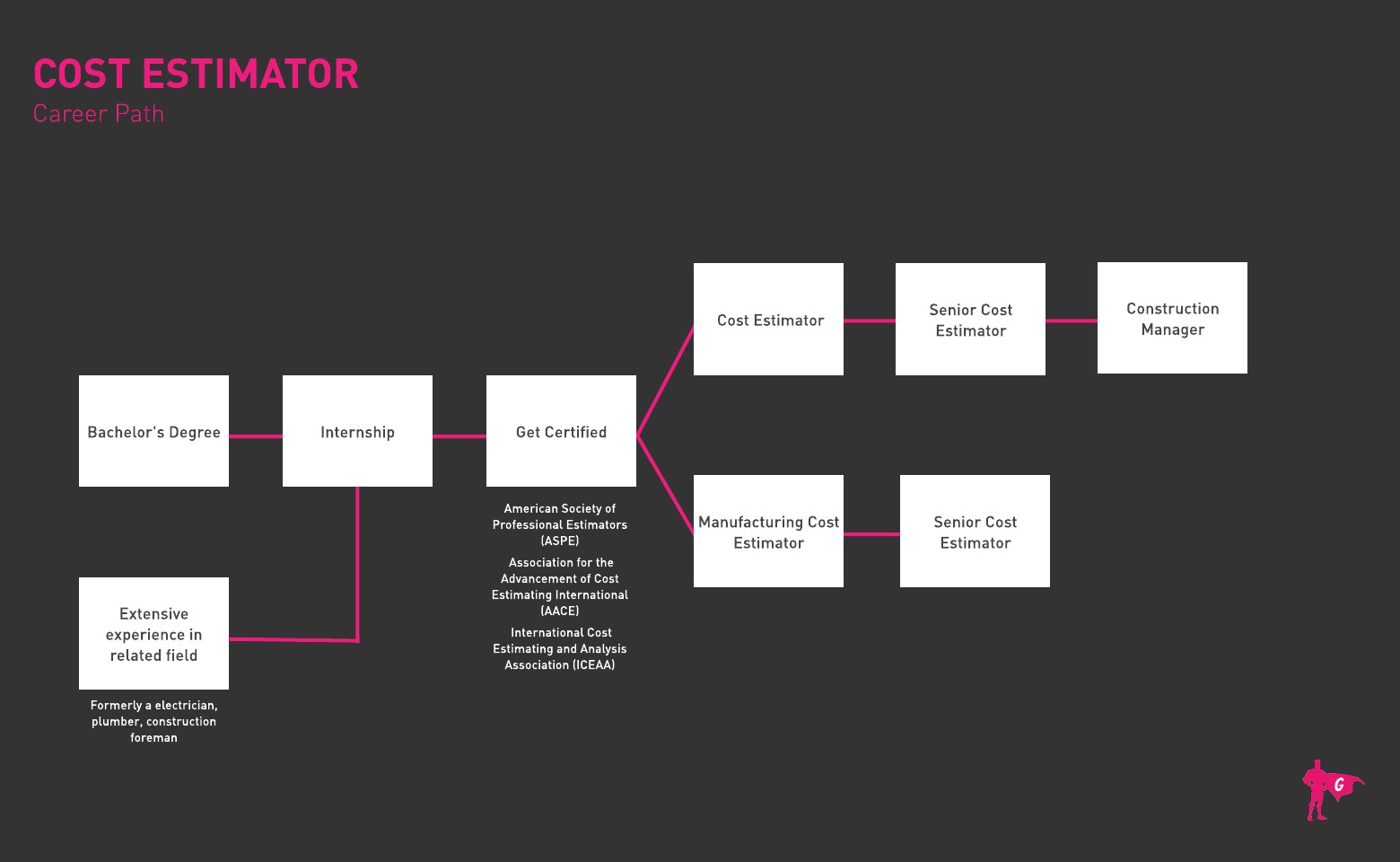Spotlights
“Cost estimator” is a term used across industries, however, those who become proficient in a certain area may be referred to by their specialty, such as construction cost estimator, engineering cost estimator, building construction estimator, etc.
A cost estimator gathers data to determine how much money, time, material, and labor are required to manufacture a product, provide a service, or construct a building. Cost estimators often develop a professional expertise in a specialized field, product, or industry.
- Helping an organization save money and make good financial decisions.
- Working as a team with other professionals to accomplish a goal.
- Using the latest technologies and having new projects to work on.
- Realizing the important role one plays in the building of structures like stadiums, airports, train stations, theaters, or hotels that people use every day.
- Being recognized as an expert in a specific area of knowledge that is valuable to others.
Generally speaking, there are two types of cost estimators:
- Construction Cost Estimators assess construction costs for projects like bridges, shopping centers, or high-rise apartments. They determine the price of raw materials, the cost of labor, and how long it will take to complete a project.
- Manufacturing Cost Estimators assess the costs associated with producing, redesigning, or developing various products and services like vehicles, software systems, and appliances.
A day in the life of a cost estimator would include working in an office but also visiting job sites or factories depending on the nature of the job. They work closely with engineers, architects, contractors, construction managers, clients, and industry experts to complete projects.
Cost estimators often perform the following tasks:
- Reading blueprints or technical documents.
- Evaluating materials required and labor needed for projects.
- Preparing bids and writing proposals for clients.
- Making recommendations on how to make projects more cost effective.
- Preparing timelines for projects to be completed.
- Determining the cost effectiveness or profitability of products.
- Organizing information and documenting the details of a project.
- Handling subcontractor proposals and assisting with contract negotiations.
General skills
- Analytical skills
- Listening and communication skills
- Detail oriented
- Aptitude for math
- Time management skills
Technical skills
- Accounting software
- Analytical or scientific software
- Database user interface and query software
- Financial analysis software
- Project management software
- Building information modeling (BIM)
- Computer aided design (CAD)
- Specialty trade contractors
- Construction of buildings
- Manufacturing
- Automotive repair and maintenance
- Heavy and civil engineering construction
Successful cost estimators have a substantial amount of knowledge and experience in their specific area of expertise, which comes from formal education plus extensive hands-on learning. A dedication to learning one’s craft is essential to be competitive in this field.
Also, it may be necessary at times to work beyond a typical forty-hour work week to write bids, keep a project on task, and meet deadlines.
- Advancements in BIM (Building Information Modeling)
- Model-based estimations
- Virtual reality
- Computational and generative design
People in this profession have a natural inclination toward data and details. As young people, they often enjoyed mapping out projects and seeing them through. They work well in teams and can help lead a group to a decision. Their “comfort zone” has routine and procedure.
- Cost Estimators usually need a bachelor’s in construction, engineering, business, or finance, depending on the exact industry they work in. Some have sufficient work experience to bypass the academic requirements
- Per Zippia, 17% of workers in this field have an associate’s, 67% a bachelor’s, and 10% a master’s
- There are many software programs to be familiar with, for accounting, computer aided design, customer relationship management, database reporting, document management, enterprise resource planning, and building information modeling
- Workers generally receive ample On-the-Job training, as well
- Ad hoc online short courses such as Coursera’s Construction Cost Estimating and Cost Control can offer useful industry-related information which may not be covered elsewhere
- Additional certifications can bolster your credentials. These include:
- AACE International, Inc. - Certified Cost Professional, Certified Estimating Professional, and Certified Cost Technician
- American Society of Professional Estimators - Certified Professional Estimator
- Construction Specifications Institute - Certified Construction Specifier
- International Cost Estimating and Analysis Association - Certified Cost Estimator/Analyst or Professional Cost Estimator/Analyst
- Decide which type of Cost Estimator you’re interested in becoming — Construction, Manufacturing, or something else
- Stock up on courses in economics, finance, and math
- Learn how to use computer aided drafting and related software like Autodesk AutoCAD, Autodesk Revit, ConEst SureCount, and Dassault Systemes CATIA
- Take on part-time jobs in the field you’re interested in to get real world experience
- Gain extra practical work experience through Cost Estimator internships
- Read articles and watch tutorials about Cost Estimating to learn from insiders
- Ask working Cost Estimators if they’ll do an informational interview or let you shadow them
- Join professional organizations to learn, grow, and network (see our Recommended Resources > Websites for a list of options)

- Roughly 36% of Cost Estimators work for speciality trade contractors; 18% work in construction, 13% in manufacturing, and the rest in automotive repair and civil engineering
- BLS projects job opportunities will be fairly consistent. Competition will be steady so to stand out you may need special certifications or experience
- Cost Estimator internships are a great way to get experience in the field
- Sign up for alerts on job portals such as Indeed, Simply Hired, Glassdoor, and Zippia, but also consider Craigslist for smaller, local jobs
- Relocate to where the work is! The states with the highest employment level for Cost Estimators are California, Texas, Florida, New York, and Pennsylvania
- Talk with your school career center for help with resumes, mock interview, and job fair info
- Ask teachers, supervisors, and co-workers to vouch for you as personal references
- Review Cost Estimator resume templates to get ideas for wording and formats
- Study Cost Estimator interview questions to prep for interviews so you can show off your knowledge!
Websites
- AACE International
- American Society of Professional Estimators
- International Cost Estimating and Analysis Association
- Project Management Institute
- Society of Cost Engineers
- The American Society of Mechanical Engineers
Books
Because cost estimators develop many types of transferable skills, there are several different career paths they can take, such as:
- Assessor
- Accountant and Auditor
- Budget Analyst
- Claims Adjuster, Appraiser, Examiner, and Investigator
- Construction Manager
- Financial Analyst and Financial Manager
- Industrial Production Manager
- Logistician
- Operations Research Analyst
- Purchasing Agent
- Market Research Analyst and Marketing Specialist
- Risk Management Specialist
- Supply Chain Managers
- Transportation Managers
All types of organizations, large and small, look for ways to control cost while delivering the best possible product or service. A cost estimator plays a key role in the profitability of a company, making their position essential to its success. Finding a professional niche that aligns with your interests and developing an expertise in that area can make for a career that is both personally and financially rewarding.
Newsfeed

Featured Jobs

Online Courses and Tools

Annual Salary Expectations
New workers start around $57K. Median pay is $74K per year. Highly experienced workers can earn around $96K.





